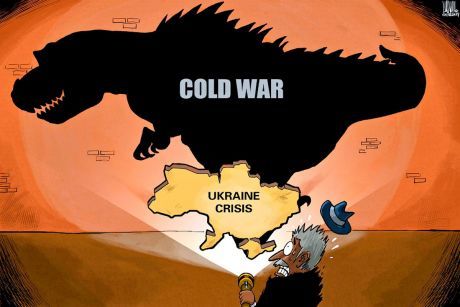Features
You are here
Ukraine and inter-imperial rivalry

April 4, 2014
The new government of Ukraine is completely incapable of meeting the needs of the people who were involved in the uprising to oust Russian backed Viktor Yanukovich. The possibility that this will lead to new and fresh misery for the Ukainian people is very real.
The IMF has agreed to an $18 billion bailout for the Ukrainian government. This bailout package has many of the features that we see in other IMF led economic programs. “Structural Adjustment” in the form of cuts to the public service and deregulation always follows the first round of bailout money. As we have seen in Greece, the impact of structural adjustment is a drop in the standard of living for ordinary people. Likewise, Russia has also decided to punish Ukraine by raising gas prices by 80 per cent.
Neither Washington nor Moscow
Neither side in this game of rival imperialism has any interest in actually bringing peace and prosperity to the Ukrainian people. Indeed, each advance by big capital, East or West, will make life even harder.
The problem with that scenario is that, given the already volatile political situation, a more devastating social crisis could lead the Ukraine to move even further towards the right. This is the breeding ground of fascism. A prolonged social crisis with no obvious alternative paves the way for anger, demoralization and the rise of far-right forces. The current Ukrainian government, while not fascist, is already on the right and beholden to the street troops of the right sector and the Svoboda party that holds a number of key cabinet positions.
At the NATO meetings in Brussels, military leaders confirmed that they will bolster the defences of eastern European countries and suspend co-operation with Russia. They stopped short of deploying troops to the Russian border, which was requested by Poland, but the dangers of more military escalation remain.
In fact, just as the meetings were beginning, a leaked NATO report stated that they were already planning to increase co-operation and engage in joint military operations with the governments of Armenia, Azerbaijan, and Moldova; all of which are seen by the Kremlin as part of Russia's sphere of influence. All this does is push a renewed arms race.
The dynamic of capitalism is pushing this confrontation. The need for more control of resources and markets and the need to curtail the ambitions of any potential rivals mean that this conflict will continue in some fashion. When Russian President Vladimir Putin says that the West has been trying to surround Russia since the end of the Cold War, he is right. That has been a goal from the beginning. However, that does not mean that he and the Russian ruling class is any better. Their own puppets in Ukraine oversaw privatization schemes and corruption that helped to destroy the Ukrainian economy.
Canadian opportunism
Canadian Prime Minister, Stephen Harper has been pushing for wider sanctions and even more confrontation with Russia. The Tories claim to be defending the interests of Ukrainian-Canadians, but this political opportunism hides economic opportunism. Sanctions don’t cost Canadian capitalism much, as the Globe and Mail reported: “Unlike the EU, which relies on Russia for most of its energy needs, Canada’s trade with Russia is less than $3-billion annually, making it our 18th largest trading partner.”
At the same time, Harper’s aggressive stance hides the interests of Canadian corporations; while SNC-Lavalin profited off the Gaddafi dictatorship in Libya before Canada joined Nato in bombing the country, Bombardier has recently signed a multi-billion dollar deal with the Russian industrial and “defence” corporation Rostec. Imperialism promotes economic integration and military rivalry at the same time
Neither Washington nor Moscow will benefit Ukrainian people, and we must clearly oppose all Canadian meddling in the affairs of the Ukraine or any other country.
Section:









